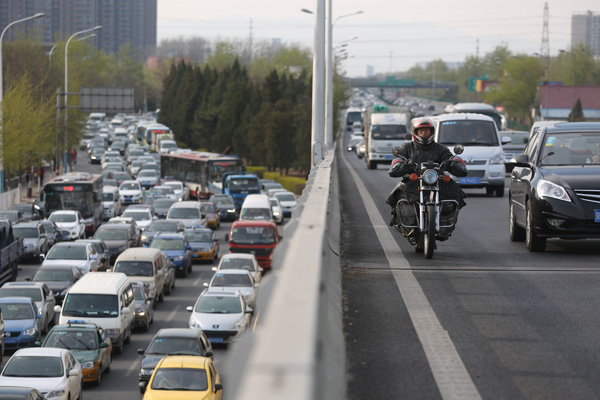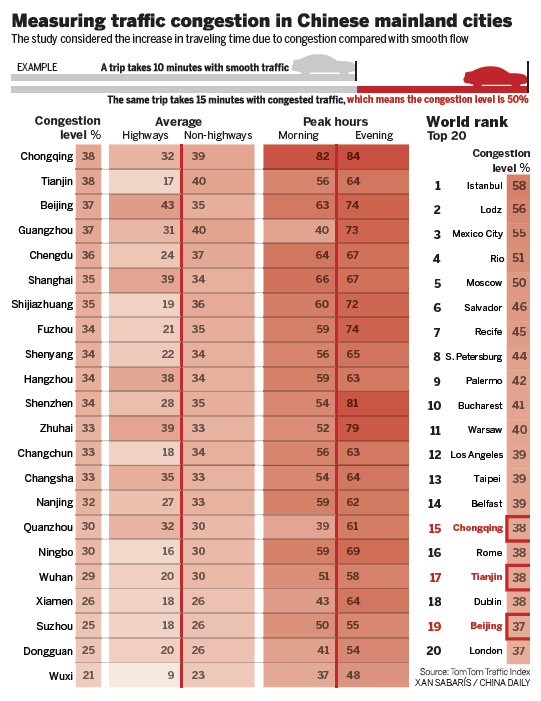Traffic woes increase on urban area roads
By WANG XIAODONG (China Daily) Updated: 2015-04-07 02:45
 |
|
Vehicles throng the Beianhe section of the Beijing-Tibet highway on the last day of the Tomb Sweeping holiday. [Photo by Wang Jing / China Daily] |
China has nearly one-third of the 50 most congested cities worldwide, report says
Nearly a third of the world's 50 most congested cities are in China, with Beijing ranking 19th, according to a traffic congestion report covering more than 200 cities worldwide.
Taipei is the most congested city in China, ranking 13th on the list.
Chongqing ranks 15th, making it the most congested city on the Chinese mainland, followed by Tianjin (17th) and Beijing, according to the report. Of the top 50 cities with the highest congestion levels, 15 are in China.
The report was released by TomTom, a global leader in navigation and mapping products, with headquarters in Amsterdam. It covered 218 cities in 36 countries and regions. All data, collected last year, was based on GPS measurements from the company's traffic database.
Istanbul in Turkey was the most congested city, with a congestion level of 58 percent, which indicates a 58 percent increase in overall travel times in the city when compared with traffic flowing freely.
The congestion level for Beijing was 37 percent, but during the evening peak it rose to 74 percent. The level for Chongqing was 38 percent.

The report said traffic congestion nearly doubled journey times during evening rush hours, the most congested time of day for most cities.
Traffic congestion has become a serious problem for many cities in China in recent years, spreading from large ones such as Beijing to many second- and third-tier cities.
Chen Yanyan, a professor at the Transportation Research Center at Beijing University of Technology, said, "In recent years, the increase in vehicles has far outpaced the development of transportation infrastructure in many places in China, causing chronic traffic congestion."
There were 126 million private vehicles in China by the end of last year, a year-on-year increase of 15.5 percent, according to the National Bureau of Statistics.
Thirty-five cities in China each had more than 1 million cars at the end of last year, including 10 that had more than 2 million cars, according to Beijing News.
Some cities facing the worst traffic congestion, including Beijing and Shanghai, have taken strict measures in recent years to discourage people from buying and using cars, such as requiring prospective buyers to obtain licenses through lotteries or auctions.
Chen said large cities need to develop public transportation systems that can handle large passenger volumes, such as subways, to relieve the traffic burden.
"Many cities — such as Tokyo — in developed countries encountered similar problems in the 1960s and 1970s," she said. "These cities have developed public transportation systems, and now most people in them rely on these systems rather than using their cars to commute.
"Subway construction is progressing rapidly in many cities in China, but time is needed for such facilities to be completed and put into use," Chen said.
Authorities also need to make it more expensive to use cars, such as charging congestion and pollution fees, she added.
Liu Fuli, an independent traffic congestion analyst, said improper urban planning, including road planning, is a major cause of traffic congestion in Beijing.
"Authorities should try to upgrade some improperly built roads, which prevent traffic flow. Innovation is needed in the design of roads in newly developed areas, and existing roads need upgrading," he said.
- Govt encourages people to work 4.5 days a week
- Action to be taken as HIV cases among students rise
- Debate grows over reproductive rights
- Country's first bishop ordained in 3 years
- China builds Tibetan Buddhism academy in Chengdu
- Authorities require reporting of HIV infections at schools
- Typhoon Soudelor kills 14 in East China
- Police crack down on overseas gambling site
- Debate over death penalty for child traffickers goes on
- Beijing to tighten mail security for war anniversary







